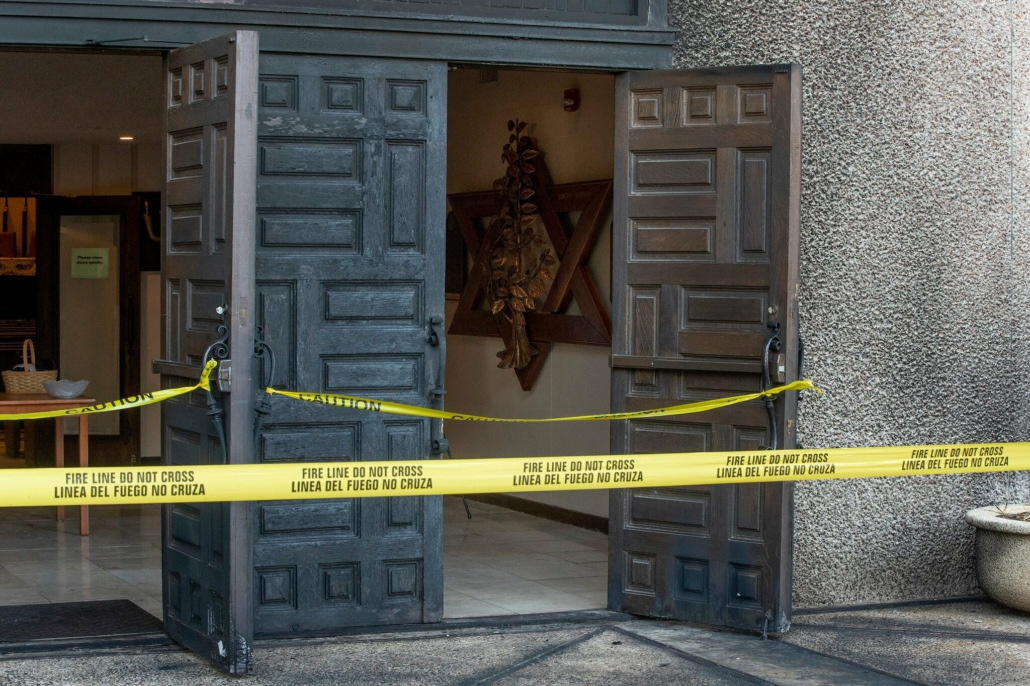Sid Closter z”l had been held hostage in the B’nai Brith building for nearly three days. Sid was a smart and kind man. I first became friendly with Sid in the 1980s. I have been thinking about his ordeal since hearing about the attack on Beth Israel synagogue in Texas. There is a lesson about how we cannot ignore the persistent threats to Jews in America.
The story of Sid’s ordeal begins with an American, Ernest McGhee, who was born in Indiana in 1921. McGhee was discharged from the U.S. Army on grounds of mental instability. He worked as a jazz drummer in New York City. McGhee converted to Islam and changed his name to Hamaas Khaalis. Khaalis split with the Nation of Islam in 1958 to found the Hanafi Movement. In 1973, five armed men entered Khaalis’ home and killed five children and one grandchild.
On March 9, 1977, seven members of Khaalis’ group burst into the headquarters of B’nai B’rith in downtown Washington and took over 100 hostages including Sid Closter. Less than an hour later, three men entered the Islamic Center of Washington, and took eleven hostages. Later, two Hanafis entered the District Building, three blocks from the White House, and quickly killed two people.
Throughout the siege, Khaalis denounced the Jewish judge who had presided at the trial of his family’s killers. He claimed that ‘the Jews control the courts and the press.”
Khaalis and his followers wanted those convicted for the 1973 murders handed over to them, presumably for execution. Three Muslim ambassadors were active participants in the negotiations, offering passages from the Quran that demonstrated Islam’s compassion and mercy. They urged the gunmen to surrender. Finally, the sieges ended on March 11, Khaalis and eleven others were tried and convicted, with Khaalis and sentenced for his role.
The younger generations may not know the many stories of attacks on Jews. Some will think their parents and grandparents to be alarmist or paranoid about the safety of Jews in the United States. We need to teach these stories to our children and grandchildren. While faith-based communities across the country face varying levels of discrimination, there is a persistent threat of violence and hate crimes against Jews and Jewish communities, primarily by domestic violent extremists.
What happened in Texas is a reminder that Jews are too often victims. Like Khaalis, the Texas shooter sought perverse justice by taking Jewish hostages. As Jonathan Greenblatt of the ADL wrote: “Unfortunately, the crisis in Colleyville is just the latest event to show that being on edge and being vigilant is now very much part of the American Jewish experience.”
In the past decade, we have seen improvements in security measures and training first responders. But there is one more thing we must do, as Jews. It comes to us from the last line of Torah for this week’s portion, Yitro.
God instructed Moses to build an altar. As a coda to the demand, God said to Moses make sure that the people “do not ascend My altar by steps, that your nakedness may not be exposed upon it.” While the intention may have been to teach about grace and modesty in the presence of God, there is another lesson. We must always be mindful of our weaknesses and areas of vulnerability.
The hate groups must not think of us as weak or forgiving. And we cannot always rely on others for every aspect of our safety. Our resolve after this latest attack is to teach our children these words of the Torah, “watch your back.”
Rabbi Evan J. Krame




